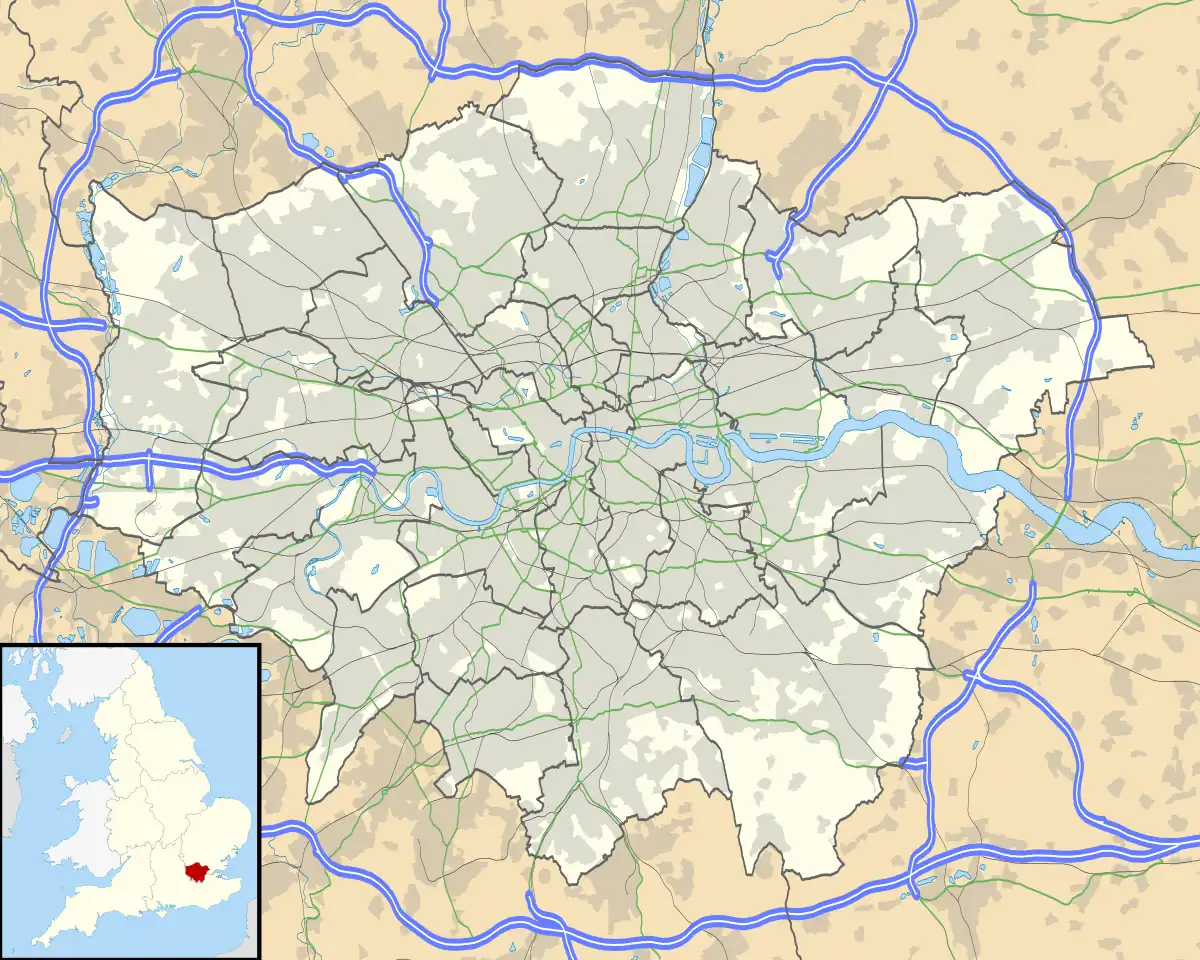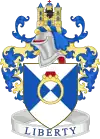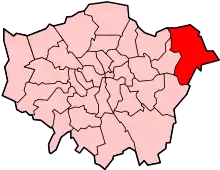Emerson Park
Emerson Park is a suburban neighbourhood in the London Borough of Havering, east London. The neighbourhood developed as two large housing estates built on the 550 acres (2.2 km2) estate of Nelmes manor in the parish of Hornchurch. Emerson Park estate to the south started construction in 1895 and Great Nelmes estate to the north was begun in 1901. It is located north of the Romford–Upminster line and a station opened at Emerson Park in 1909. The mansion of Nelmes survived until it was demolished in 1967 to avoid preservation by the Civic Amenities Act and was replaced with a small housing estate called The Witherings. Emerson Park is located 15 miles (24.1 km) northeast of Charing Cross in Central London.
| Emerson Park | |
|---|---|
 Parkstone Avenue in the Emerson Park estate | |
 Emerson Park Location within Greater London | |
| Population | 11,977 (Emerson Park ward 2011)[1] |
| OS grid reference | TQ545885 |
| • Charing Cross | 15 mi (24 km) WSW |
| London borough | |
| Ceremonial county | Greater London |
| Region | |
| Country | England |
| Sovereign state | United Kingdom |
| Post town | HORNCHURCH |
| Postcode district | RM11 |
| Dialling code | 01708 |
| Police | Metropolitan |
| Fire | London |
| Ambulance | London |
| UK Parliament | |
| London Assembly | |
History
Toponymy
Emerson Park is named after Emerson, the eldest son of William Carter of Parkstone, Dorset who bought land in the area for property development in 1895.[2] Prior to suburban housebuilding, it was the manor of Nelmes which was recorded as Elmes in 1333.[3]
Economic development
The railway came to the parish of Hornchurch with the Great Eastern Railway opening a station at Harold Wood in 1868 and the London, Tilbury and Southend Railway at Hornchurch in 1885. Both were some distance from the village of Hornchurch.[4] The London, Tilbury and Southend built a branch line from Upminster to Romford in 1893 which skirted the southern boundary of Nelmes manor. A station, initially called Emerson Park and Great Nelmes Halt, was opened on 1 October 1909. The London, Tilbury and Southend became part of the Midland Railway in 1912.
In 1899 the Emerson Park Stores opened and the Chequers Inn was rebuilt.[5] The Emerson Park Stores was converted to a club for the Hornchurch Liberal association, with an official opening on 16 June 1910.[6]
Residential estates
In 1894 the Nelmes estate, in the parish of Hornchurch, is listed as comprising two houses, three farms, market gardens and other land, totalling 550 acres (2.2 km2).[7]
In 1895 the southern part of Nelmes manor, comprising 200 acres (0.81 km2), was sold by Benjamin H Newman to William Carter.[8] In the next ten years 200 homes of the Emerson Park Estate were constructed by Homesteads Limited. The houses were large, detached and typically situated on plots of an acre. There was some variety in the houses and the original sales prices ranged from £300 to £1,000.[4]
In 1901 the northern portion of Nelmes manor, comprising 241 acres (0.98 km2), was sold for the Great Nelmes Estate.[4] Louis Sinclair, the local MP, was listed as tenant of the mansion.[9]
The estates were subject to restrictive covenants which prevented an increased density of housing. In 1930 a development of 76 homes on the Wych Elm Farm was proposed which would have a density of nine semi-detached homes per acre and would be sold at £1,000 per pair. This was opposed by residents of the Emerson Park and Great Nelmes estates. The arbitration of the case resulted in detached properties of six per acre sold at £650 facing the Emerson Park estate to the west and semi-detached properties at the higher density to the east.[10][11]
Nelmes manor house
Nelmes manor house was built by in 1540 by William Roche, who was Lord Mayor of London.[12] Roche had purchased two manors in Havering that had been held separately,[13] Gobions in Romford and Nelmes in Hornchurch. Nelmes was held by the Roche family and then sold to the politician Robert Naunton in the 1620s. The manor was held by the Naunton family and then sold to the postal administrator Thomas Witherings around 1646.[8]
The Nelmes mansion and about three acres of grounds, sandwiched between the two housing estates, were sold in 1903 to Alfred Barber. He sold it in 1925 to John H. Platford and it was inherited by Roy Platford in 1966.[8] The house was demolished by Platford in 1967 to avoid a preservation order by the Greater London Council as part of the incoming Civic Amenities Act 1967.[14] The land was used for The Witherings neo-Georgian style housing development.[15] Part of the moat appears to have been retained.[16] Capel Nelmes, a 16th century outbuilding, survived and was grade II listed in 1972.[17] The 17th century conduit house which provided water to Nelmes also survives and was grade II listed in 1974.[18]
Governance
Emerson Park forms a ward for elections to Havering London Borough Council. The wards were redrawn for the 2022 election and since then two councillors are elected.[19][20]
Emerson Park is part of the Hornchurch and Upminster Parliamentary constituency and the Havering and Redbridge London Assembly constituency.
Geography
Emerson Park is located approximately 0.6 miles (1.0 km) northeast of Hornchurch town centre and 15 miles (24.1 km) northeast of Charing Cross in Central London. It is part of the RM11 postcode district in the Hornchurch post town. The Emerson Park electoral ward revision in 2022 more closely approximates the neighbourhood, by removing land north of the A127 Southend Arterial Road and west of The Ravensbourne.[21][22]
Transport
Emerson Park railway station is on Romford–Upminster line with a half-hourly London Overground service.[23] The short branch line provides links to Romford for connection to the Elizabeth line and Great Eastern Main Line and to Upminster for connection to the District line of the London Underground and the London, Tilbury and Southend line. Emerson Park is served by London Buses routes 193, 256 and 370.[24]
References
- Census Information Scheme (2012). "2011 Census Ward Population figures for London". Greater London Authority. Retrieved 17 October 2023.
- Mills, D. (2000). Oxford Dictionary of London Place Names. Oxford.
- "(Great) Nelmes". Survey of English Place-Names. Retrieved 21 August 2023.
- "Hornchurch: Introduction". British History Online. 1978. Retrieved 21 August 2023.
- "Emerson Park, Havering". Hidden London. Retrieved 22 August 2023.
- "Hornchurch Liberal Club". Essex Chronicle. 17 June 1910. p. 8.
- "Failure of an Essex Landed Proprietor". Essex Chronicle. 29 June 1894. p. 3.
- "Hornchurch: Manors". British History Online. 1978. Retrieved 21 August 2023.
- "Sale This Day". Essex Chronicle. 3 May 1901. p. 4.
- "Hornchurch Arbitration Result". Essex Chronicle. 22 August 1930. p. 8.
- The Estates Gazette Digest of Land and Property Cases. Estate Gazette, Limited. 1931.
- Pevsner, Nikolaus, ed. (2005). London: East. Yale University Press. p. 20.
- McIntosh, Marjorie (2002). The Manor and Liberty of Havering-atte-Bower 1500-1620.
- "Owner Destroys Ancient Essex Manor". The Daily Telegraph. 28 August 1967.
- "How Nelmes' glory days ended with wrecking ball". Romford Recorder. 14 October 2017. Retrieved 21 August 2023.
- Cherry, Bridget. "The Thames Gateway: An introduction to the historical landscapes of the northern riverside". Historic England. Retrieved 21 August 2023.
- "Capel Nelmes". Historic England. Retrieved 21 August 2023.
- "Well Tower at Tower Lodge". Historic England. Retrieved 21 August 2023.
- "The London Borough of Havering (Electoral Changes) Order 2021". legislation.gov.uk. 16 September 2021. Retrieved 21 August 2023.
- "Map referred to in the London Borough of Havering (Electoral Changes) Order 2021" (PDF). Local Government Boundary Commission for England. Retrieved 21 August 2023.
- "Emerson Park ID 8206". MapIt: UK. Retrieved 21 August 2023.
- "Emerson Park ID 165390". MapIt: UK. Retrieved 21 August 2023.
- "Romford to Upminster route" (PDF). Transport for London. 21 May 2023. Retrieved 21 August 2023.
- "Buses from Emerson Park" (PDF). Transport for London. 1 June 2015. Retrieved 21 August 2023.

